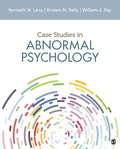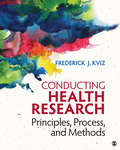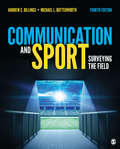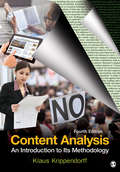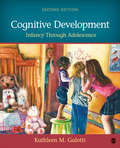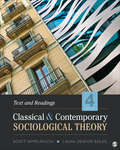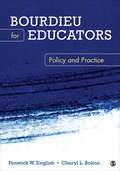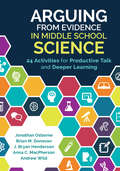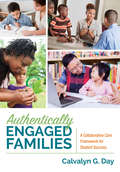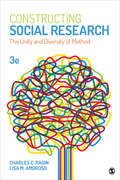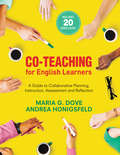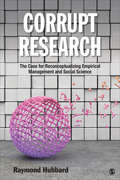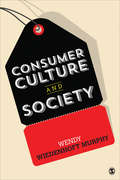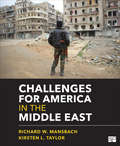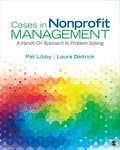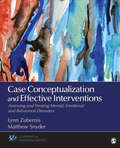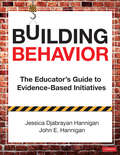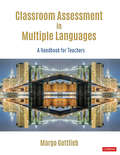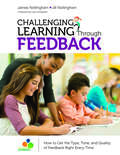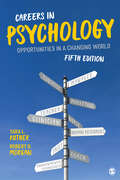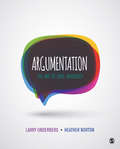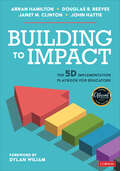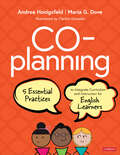- Table View
- List View
Case Studies in Abnormal Psychology: Ray: Abnormal Psychology 2e (loose Leaf) + Levy: Case Studies In Abnormal Psychology
by William J. Ray Kristen M. Kelly Kenneth N. LevyThis comprehensive work presents a broad range of cases drawn from the clinical experience of authors Kenneth N. Levy, Kristen M. Kelly, and William J. Ray to take readers beyond theory into real-life situations. The authors take a holistic approach by including multiple perspectives and considerations, apart from those of just the patient. Each chapter follows a consistent format: Presenting Problems and Client Description; Diagnosis and Case Formulation; Course of Treatment; Outcome and Prognosis/Treatment Follow-up; and Discussion Questions. Providing empirically supported treatments and long-term follow-up in many case studies gives students a deeper understanding of each psychopathology and the effects of treatment over time. Also of Interest >Abnormal Psychology, Second Edition: A person-first, multilevel approach toward a clear and complete understanding of abnormal psychology—the perfect core text for your course. Use Bundle ISBN: 978-1-5063-8153-4.
Conducting Health Research: Principles, Process, and Methods
by Frederick J. KvizConducting Health Research: Principles, Process, and Methods presents an integrated and practical introduction to the principles and strategies for planning, implementing, reporting, and assessing health sciences research. Comprehensive in its breadth and depth, with an accessible writing style, this text prepares students in public health and related fields to be adept researchers and consumers of health research. Through real-world examples and step-by-step guidance, Frederick J. Kviz provides students with the skills they need to: identify and evaluate research strengths and limitations as practitioners; to actually perform the various core aspects of research; and to choose among alternative methods when making decisions about health practice, policy, and future research needs.
Communication and Sport: Surveying the Field
by Andrew C. Billings Michael L. ButterworthCommunication and Sport: Surveying the Field provides students with an understanding of sports media, rhetoric, culture, and organizations through an examination of a wide range of topics. Authors Andrew C. Billings and Michael L. Butterworth address everything from youth to amateur to professional sports through varied lenses, including mythology, community, and identity. A comprehensive focus on communication scholarship gives attention to the ways that sports produce, maintain, or resist cultural attitudes about race, gender, sexuality, class, and politics. The Fourth Edition includes new interviews with prominent figures in the field and new discussions on current events like the Black Lives Matter movement and the COVID-19 pandemic.
Content Analysis: An Introduction to Its Methodology
by Klaus KrippendorffWhat matters in people’s social lives? What motivates and inspires our society? How do we enact what we know? Since the first edition published in 1980, Content Analysis has helped shape and define the field. In the highly anticipated Fourth Edition, award-winning scholar and author Klaus Krippendorff introduces readers to the most current method of analyzing the textual fabric of contemporary society. Students and scholars will learn to treat data not as physical events but as communications that are created and disseminated to be seen, read, interpreted, enacted, and reflected upon according to the meanings they have for their recipients. Interpreting communications as texts in the contexts of their social uses distinguishes content analysis from other empirical methods of inquiry. Organized into three parts, Content Analysis first examines the conceptual aspects of content analysis, then discusses components such as unitizing and sampling, and concludes by showing readers how to trace the analytical paths and apply evaluative techniques. The Fourth Edition has been completely revised to offer readers the most current techniques and research on content analysis, including new information on reliability and social media. Readers will also gain practical advice and experience for teaching academic and commercial researchers how to conduct content analysis.
Cognitive Development: Infancy Through Adolescence
by Kathleen M. GalottiWritten in Kathleen M. Galotti′s signature engaging style, this text is a dynamic examination of cognitive development from infancy through adolescence. Updated and reorganized throughout, the Second Edition weaves together a variety of theoretical perspectives while considering issues of research methodology. Introductory chapters cover theoretical and developmental frameworks and are followed by chronologically arranged chapters, giving undergraduate and graduate students an understanding of the "whole" child in an accessible, intuitive framework.
Classical and Contemporary Sociological Theory: Text and Readings
by Scott Appelrouth Laura D. EdlesThe authors are proud sponsors of the 2020 SAGE Keith Roberts Teaching Innovations Award—enabling graduate students and early career faculty to attend the annual ASA pre-conference teaching and learning workshop. Now available for the first time in print and e-book formats Classical and Contemporary Sociological Theory: Text and Readings offers students with the best of both worlds—carefully-edited excerpts from the original works of sociology′s key thinkers accompanied by an analytical framework that discusses the lives, ideas, and historical circumstances of each theorist. This unique format enables students to examine, compare, and contrast each theorist’s major themes and concepts. In the Fourth Edition of this bestseller, examples from contemporary life and a rich variety of updated pedagogical tools (tables, figures, discussion questions, and photographs) come together to illuminate complex ideas for today’s readers. Included with this title: The password-protected Instructor Resource Site (formally known as SAGE Edge) offers access to all text-specific resources, including a test bank and editable, chapter-specific PowerPoint® slides.
Bourdieu for Educators: Policy and Practice
by Fenwick W. English Cheryl L. BoltonEducational change and reform on a larger scale Bourdieu for Educators: Policy and Practice brings the revolutionary research and thinking of Pierre Bourdieu (1930-2002) of France to public educational leaders in North America, Canada, Australia, and the U.K. This text brings Bourdieu’s work into the arena of elementary and secondary educational reform and change, and offers policy, research, and practice discussions. Authors Fenwick W. English and Cheryl L. Bolton use Bourdieu to challenge the standards movement in different countries, the current vision of effective management, and the open-market notion connecting pay to performance. The text shows that connecting pay to performance won’t improve education for the poorest group of school students in the U.S., Canada, or the U.K., regardless of how much money is spent trying to erase the achievement gap. The authors lay out the bold educational agenda of Pierre Bourdieu by demonstrating that educational preparation must take into account larger socioeconomic-political realities in order for educational change and reform to make an impact.
Arguing From Evidence in Middle School Science: 24 Activities for Productive Talk and Deeper Learning
by Brian M. Donovan Anna C. MacPherson Andrew J. Wild Jonathan Francis Osborne J. (Joseph) HendersonTeaching your students to think like scientists starts here! If you’ve ever struggled to help students make scientific arguments from evidence, this practical, easy-to-use activity book is for you! Give your students the critical scientific practice today′s science standards require. You’ll discover strategies and activities to effectively engage students in arguments about competing data sets, opposing scientific ideas, applying evidence to support specific claims, and more. 24 ready-to-implement activities drawn from the physical sciences, life sciences, and earth and space sciences help teachers to: Align lessons to the Next Generation Science Standards (NGSS) Engage students in the 8 NGSS science and engineering practices Establish rich, productive classroom discourse Facilitate reading and writing strategies that align to the Common Core State Standards Extend and employ argumentation and modeling strategies Clarify the difference between argumentation and explanation Includes assessment guidance and extension activities. Learn to teach the rational side of science the fun way with this simple and straightforward guide!
Authentically Engaged Families: A Collaborative Care Framework for Student Success
by Calvalyn G. DayCreate a plan to connect with every family! There’s no doubt that family engagement makes a world of difference for teachers and students—but connecting with parents of various ethnic, socioeconomic, or cultural backgrounds can be challenging for educators. Calvalyn Day’s groundbreaking book offers clear instructions for building strong relationships, beginning effective dialogues, strategizing, and monitoring progress. Through the author’s perspective as a parent, counselor, and advisor to families at risk, readers will discover A step-by-step approach to family engagement developed for K-12 educators, including teachers, counselors, administrators and others Complete how-to’s for creating and carrying out a family engagement plan based on the author’s Vision, Plan, Action model Tools including a Parent Meeting Agenda, a Parent Empathy Map, an Educator Needs Assessment, and more Whether you work at a small rural school, in a large urban district, or anywhere in between, this invaluable book offers wisdom—and smart strategies—that will transform the experience for your students and their families, and lead to sustainable success. "Authentically Engaging Families is a wonderful guide for all those interested in engaging parents in the educational process in a variety of essential and creative ways." Nina Orellana, MTSS Coordinator Palm Bay Academy Charter School "This book presents a much-needed illustration of why educators MUST improve family engagement and how educators can put these evidence-based approaches into practice." Denise Michelle Voelker, Coordinator of Education and Training Programs University of Florida
Constructing Social Research: The Unity and Diversity of Method (Sociology For A New Century Ser.)
by Charles C. Ragin Lisa M. AmorosoThe updated Third Edition of this innovative text shows the unity within the diversity of activities called social research to help students understand how all social researchers construct representations of social life using theories, systematic data collection, and careful examination of that data. The book tackles questions like "What is social research?", "How does it differ from journalism, documentary film-making, or laboratory research in the natural sciences?", and "What is the researcher′s obligation to those he or she is studying?" Updated throughout with new references and examples, this edition is designed to evoke challenging questions regarding the nature of representation and the ethical challenges facing social scientific researchers. The text moves beyond standard research challenges to push readers to see the complex relationships among ethics, ideas, evidence, and outcomes.
Co-Teaching for English Learners: A Guide to Collaborative Planning, Instruction, Assessment, and Reflection
by Maria G. Dove Andrea Honigsfeld"Dove and Honigsfeld′s new book arrives at the perfect time as an increasing number of schools move to a collaborative instructional model and are searching for guidance. The authors not only tell us how to effectively collaborate and co-teach to benefit English learners, they actually show us what each component of the collaborative instructional cycle looks and feels like, complemented by innovative video and web content." —DIANE STAEHR FENNER, Coauthor of Unlocking ELs’ Potential and President of SupportEd Because teacher collaboration isn’t an option, it’s a MUST! The proof is borne out by any assessment: our non-native speakers learn faster and achieve more when general ed teachers and EL specialists co-plan and co-deliver instruction in the very same classroom. That’s why you’ll want to put Co-Teaching for English Learners at the top of your reading list. Step by step, EL authorities Maria Dove and Andrea Honigsfeld walk you through the entire collaborative instruction cycle, along with seven potential classroom configurations from which to choose. Whether you’re new to co-teaching or just see room for improvement in your practice, this practical handbook delivers every technique and tool you need to make the most of your collaboration, including video footage of co-teaching in action. Inside you’ll find: • In-depth profiles of the seven models, with detailed descriptions and analyses • A review of advantages and challenges of each model’s implementation • Clear explanations of each teacher’s role along with self-assessment tools • Tried-and-true strategies for the entire instructional cycle: co-planning, co-instruction, co-assessment, and reflection • Real-life accounts from co-teaching veterans Long gone are the days when our ELs are taught in isolation—and rightfully so. Read Co-Teaching for English Learners, implement its strategies, and soon enough you, too, can set up a learning environment in which all students thrive.
Belonging and Inclusion in Identity Safe Schools: A Guide for Educational Leaders
by Amy Epstein Becki Cohn-Vargas Alexandrea Creer Kahn Kathe GogolewskiLead an identity safe learning community where students of all backgrounds thrive Students of all backgrounds reach their full potential when they feel a sense of belonging and inclusion. When their social identities are valued as assets rather than barriers to learning, they flourish. This guide provides evidence-based strategies that support you as a leader in creating an environment that promotes identity safe students, who experience a challenging curriculum that respects their diverse social identities. Features in the book include: Guiding principles for student voice, equalizing status and cultivating acceptance across race, ethnicity, gender and other differences Ideas and examples for anti-racist dialogue and activities for teachers and students that counter colorblind practices, stereotype threat and biases Vignettes, and examples of identity safe practices for students and adult learning for staff, families and the community Systems for student-centered assessment and data collection Resources for developing equitable school policies and a comprehensive identity safety plan for your school Educators fulfill the promise of an equitable education when students of all backgrounds know that who they are and what they think matters. Start the journey to become an identity safe school and see the results for yourself! “Belonging and Inclusion in Identity Safe Schools: A Guide for Educational Leaders is a timely and important book. For several years, the nation′s schools have been asked to focus their energies on raising student achievement. However, too often educators have ignored the need to honor, support and affirm the identities of the students they serve. For educators who serve children of color, particularly Black, Native American and Latinx children who are often subject to overt and covert forms of forced assimilation, this book will be an invaluable resource on how to create learning opportunities that make it possible for such children to thrive.” ~Pedro Noguera, Dean of Rossier School of Education, University of Southern California “Bravo to authors Cohn-Vargas, Gogolewski, Creer Kahn, and Epstein for their ground-breaking book on Identify Safe Schools for Administrators and Teacher and Staff Leaders! They provide much-needed evidence for educators to elevate and even inspire the equity, empowerment, and academic growth needed to wholly support all children to flourish in school and their lives.” ~Debbie Zacarian, Director, Zacarian and Associates
Corrupt Research: The Case for Reconceptualizing Empirical Management and Social Science
by Raymond HubbardAddressing the immensely important topic of research credibility, Raymond Hubbard’s groundbreaking work proposes that we must treat such information with a healthy dose of skepticism. This book argues that the dominant model of knowledge procurement subscribed to in these areas—the significant difference paradigm—is philosophically suspect, methodologically impaired, and statistically broken. Hubbard introduces a more accurate, alternative framework—the significant sameness paradigm—for developing scientific knowledge. The majority of the book comprises a head-to-head comparison of the "significant difference" versus "significant sameness" conceptions of science across philosophical, methodological, and statistical perspectives.
Consumer Culture and Society
by Wendy Wiedenhoft MurphyThe author is a proud sponsor of the 2020 SAGE Keith Roberts Teaching Innovations Award—enabling graduate students and early career faculty to attend the annual ASA pre-conference teaching and learning workshop. Consumer Culture and Society offers an introduction to the study of consumerism and mass consumption from a sociological perspective. It examines what we buy, how and where we consume, the meanings attached to the things we purchase, and the social forces that enable and constrain consumer behavior. Opening chapters provide a theoretical overview and history of consumer society and featured case studies look at mass consumption in familiar contexts, such as tourism, food, and higher education. The book explores ethical and political concerns, including consumer activism, indebtedness, alternative forms of consumption, and dilemmas surrounding the globalization of consumer culture.
Challenges for America in the Middle East
by Richard W. Mansbach Kirsten L. TaylorChallenges for America in the Middle East offers a comprehensive and contemporary analysis of the foreign policy challenges the United States faces in the Middle East. It takes a close look at the critical policy dilemmas posed by radical Islam, the Arab Spring, the Shia Crescent, and Israel–Palestine relations. Authors Richard W. Mansbach and Kirsten L. Taylor examine the issues from a historical perspective and in the context of the current state of affairs, and analyze options for future action. Throughout the text, they emphasize the interplay of foreign and domestic issues in the United States and overseas, and show how that interplay shapes American policy towards the region.
Cases in Nonprofit Management: A Hands-On Approach to Problem Solving
by Pat Libby Laura Jeanne Deitrick"Libby and Detrick have compiled their extensive knowledge of the real issues that face our nonprofit sector to help students glean important lessons from each case. It is refreshing to have such a tool to assist in the education of our future nonprofit leaders." —Emma A. Powell, Western Michigan University Case Studies in Nonprofit Management by Pat Libby and Laura Deitrick consists of original cases that are designed to teach students how to think critically, hone their decision-making skills, and learn to apply leadership and management principles that are essential for any nonprofit professional. These case studies illustrate the multifaceted nature of the nonprofit management sector and bring concepts like nonprofit leadership, risk management, advocacy, and grant making to life.
Case Conceptualization and Effective Interventions: Assessing and Treating Mental, Emotional, and Behavioral Disorders (Counseling and Professional Identity)
by Lynn D. Zubernis Matthew J. SnyderWith fully integrated DSM-5 criteria and current CACREP standards, this text examines case conceptualization and effective treatments across the most common disorders encountered in counseling. The comprehensive approach helps readers develop their professional identities as well as their case conceptualization and intervention skills. Each chapter blends current theory and research with case illustrations and guided practice exercises to anchor the material in real-world application. Using an innovative new Temporal/Contextual (T/C) Model, the book provides an easy-to-apply and practical framework for developing accurate and effective case conceptualizations and treatment plans. Case Conceptualization and Effective Interventions is part of the SAGE Counseling and Professional Identity Series, which targets specific competencies identified by CACREP (Council for Accreditation of Counseling and Related Programs).
Building Behavior: The Educator′s Guide to Evidence-Based Initiatives
by John E. Hannigan Jessica Djabrayan HanniganBuild the behavior system your students need and deserve Students deserve a safe, welcoming, and tolerant learning environment in which high expectations for academic and social/emotional learning will flourish. To achieve this, schools must implement consistent behavior initiatives that are rooted in equity and clear in outcome and purpose. Which plan is best for your students’ needs? In Building Behavior, authors Jessica Djabrayan Hannigan and John Hannigan identify the strengths of six major research-based behavior initiatives and offer practical guidance for implementing one or more that meet the unique needs of your students and school. They explore and connect the relationship of effect sizes and influence of six common behavior initiatives—Positive Behavior Interventions and Supports, Character Education, Restorative Justice, Culturally Responsive Teaching, Trauma Informed Practices, and Social and Emotional Learning—to help educators understand the purpose of each and give school leaders a starting point for adding to, refining, or building a tailored behavior system that is effective and manageable. Building Behavior includes: Common definitions, frameworks, best practice resources, and tips for implementing and synthesizing each of the behavior initiatives Reflective prompts that connect the existing body of knowledge with real life experiences and practices Reproducible resources, including sample schoolwide and district-wide assessments Tips to avoid common implementation challenges and missteps Don’t just reach for the "next best thing." Learn to select, self-assess, and build a plan for effective implementation of a behavior system that meets the diverse academic and social/emotional learning needs of your students. "This book offers comprehensive, unbiased information on effective behavior initiatives and provides effective tools for implementing the action plan that best fits a school. It provides a one-stop shop that educators can use to evaluate their current behavior plan, research the most current behavior initiatives, and tailor-fit an initiative for their school." - Mandy White, Science Teacher, Vicenza Middle School, U.S. Department of Defense Education Activity
Bourdieu for Educators: Policy and Practice
by Fenwick W. English Cheryl L. BoltonEducational change and reform on a larger scale Bourdieu for Educators: Policy and Practice brings the revolutionary research and thinking of Pierre Bourdieu (1930-2002) of France to public educational leaders in North America, Canada, Australia, and the U.K. This text brings Bourdieu’s work into the arena of elementary and secondary educational reform and change, and offers policy, research, and practice discussions. Authors Fenwick W. English and Cheryl L. Bolton use Bourdieu to challenge the standards movement in different countries, the current vision of effective management, and the open-market notion connecting pay to performance. The text shows that connecting pay to performance won’t improve education for the poorest group of school students in the U.S., Canada, or the U.K., regardless of how much money is spent trying to erase the achievement gap. The authors lay out the bold educational agenda of Pierre Bourdieu by demonstrating that educational preparation must take into account larger socioeconomic-political realities in order for educational change and reform to make an impact.
Classroom Assessment in Multiple Languages: A Handbook for Teachers
by Margo GottliebWhat if multilingual learners had the freedom to interact in more than one language with their peers during classroom assessment? What if multilingual learners and their teachers in dual language settings had opportunities to use assessment data in multiple languages to make decisions? Just imagine the rich linguistic, academic, and cultural reservoirs we could tap as we determine what our multilingual learners know and can do. Thankfully, Margo Gottlieb is here to provide concrete and actionable guidance on how to create assessment systems that enable understanding of the whole student, not just that fraction of the student who is only visible as an English learner. With Classroom Assessment in Multiple Languages as your guide, you’ll: Better understand the rationale for and evidence on the value and advantages of classroom assessment in multiple languages Add to your toolkit of classroom assessment practices in one or multiple languages Be more precise and effective in your assessment of multilingual learners by embedding assessment as, for, and of learning into your instructional repertoire Recognize how social-emotional, content, and language learning are all tied to classroom assessment Guide multilingual learners in having voice and choice in the assessment process Despite the urgent need, assessment for multilingual learners is generally tucked into a remote chapter, if touched upon at all in a book; the number of resources narrows even more when multiple languages are brought into play. Here at last is that single resource on how educators and multilingual learners can mutually value languages and cultures in instruction and assessment throughout the school day and over time. We encourage you to get started right away. “Margo Gottlieb has demonstrated why the field, particularly the field as it involves the teaching of multilingual learners, needs another assessment book, particularly a book like this. . . . Classroom Assessment in Multiple Languages quite likely could serve as a catalyst toward the beginning of an enlightened discourse around assessment that will benefit multilingual learners.” ~Kathy Escamilla
Challenging Learning Through Feedback: How to Get the Type, Tone and Quality of Feedback Right Every Time (Corwin Teaching Essentials)
by James A. Nottingham Jill NottinghamUsing feedback to enhance learning Feedback has the potential to dramatically improve student learning – if done correctly. In fact, providing high quality feedback is one of the most critical roles of a teacher. But if feedback is not done correctly it can have a minimal – or even negative effect – on learning. Challenging Learning Through Feedback provides educators with the tools they need to establish clear learning intentions and success criteria in order to craft high quality feedback and avoid common feedback mistakes. Readers will learn When feedback is (and isn’t) working How to design feedback so that it answers three essential questions Strategies for crafting clear Learning Intentions and Success Criteria How to teach students to give high quality feedback to themselves and others Written by educational innovators James Nottingham and Jill Nottingham, this book is full of specific examples for educators who want to understand the qualities of excellent feedback and how to craft it. "Feedback – a noun or a verb? A separate practice or an integral part of the learning process? Something we do ‘to students’ or ‘with students’? The Nottinghams sort it all out for us – the ‘what,’ ‘why,’ and ‘how’ of the process and the practice of feedback." Barb Pitchford, Co-author Leading Impact Teams: Building a Culture of Efficacy (2016) "Finally a practical book on feedback for teachers! It is written with the teacher in mind, lesson plan in hand, and relevant to all in education. The perfect school-wide study book!" Lisa Cebelak, Education Consultant Grand Rapids, MI
Careers in Psychology: Opportunities in a Changing World
by Tara L. Kuther Robert D. MorganConnecting career aspirations with the post-college world is crucial for students today. Learners must keep sight of future career opportunities while exploring a broad expanse of degrees paths and career options. Careers in Psychology, Fifth Edition helps students navigate and plan for their futures by offering exposure to the rich careers in each subfield of psychology and prompting students to consider the what, why and how of each option. In doing so, the text supports students as they determine whether a major and career in psychology is for them. Offering salary and career information, advice on getting a job after graduation, and information on applying to graduate school in psychology Tara L. Kuther and Robert D. Morgan support students in making an educated decision about their futures and career options.
Argumentation: The Art of Civil Advocacy
by Larry B. Underberg Heather NortonArgumentation: The Art of Civil Advocacy teaches students the principles of argumentation as a practical way to engage in interpersonal and public deliberation. Authors Larry Underberg and Heather Norton offer a unique approach for creating civil discourse by encouraging students to consider how they argue with others to enhance or diminish opportunities for future dialogue. A variety of everyday examples are provided in the text to demonstrate how well-reasoned argumentation can strengthen communities and create productive citizenship. Students gain a better understanding for the situations, environments, and relationships that form the context for an advocate, and how those factors can influence discourse.
Building to Impact: The 5D Implementation Playbook for Educators
by Douglas B. Reeves John Hattie Arran Hamilton Janet May ClintonTurn ideas into goals—and goals into impact The road to school improvement and student achievement is paved with good intentions—so why does the destination seem so far away? If you’re like most educators, the answer is a pothole known as the implementation gap. This book provides a road map to bypassing that gap in your school or district, offering a carefully researched, field-tested methodology that takes leadership teams, professional learning communities, and educators all the way from good ideas to systematic impact. Following the five Ds, you’ll: Discover goals worth pursuing and problems worth addressing Design instruments and actions that generate deep impact Deliver interventions and collect data Double-back to monitor your progress and evaluate the impact Double-up to enhance, sustain, and scale your success You became an educator to make a difference in students’ lives. With this playbook, you’ll transform research and ideas into achievable actions—and make maximum impact.
Co-Planning: Five Essential Practices to Integrate Curriculum and Instruction for English Learners
by Maria G. Dove Andrea HonigsfeldPool your collective wisdom in support of your English learners! English Learners (ELs) and multilingual learners (MLs) have double the work of their English-speaking peers as they are required to master language and content simultaneously. To support this dynamic academic and language development process, all teachers need to have an understanding of language acquisition and EL/ML-specific methodologies along with offering social-emotional support to ELs/MLs and work in tandem with each other. Bestselling authors Andrea Honigsfeld and Maria G. Dove have returned with this new resource that complements and expands on their previous titles on co-teaching and collaboration by addressing collaborative planning in greater depth. Co-planning is positioned as the first step toward integrative language and content instruction as regular and purposeful collaboration ensures that Els/MLs have access to core content. Key features include: • Practical, step-by-step guidance to starting and sustaining collaborative planning for integrated language, literacy, and social-emotional development • An array of checklists, templates, and protocols for immediate implementation • Snapshots from the Field provide real-life examples of co-planning in action • Beautiful full-color design with original sketch notes to bring concepts to life • QR codes that link to author interviews elaborating on key ideas This substantial guide will assist novice and seasoned educators alike in their move away from isolated practices and help them engage in collaborative planning and professional dialogue about asset-based, best practices for ELs/MLs.
